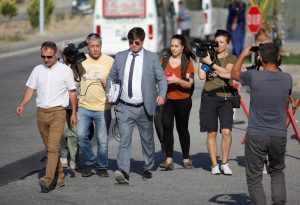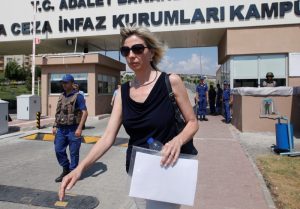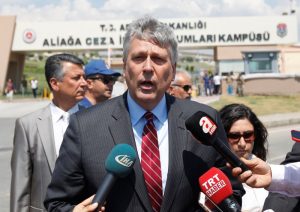
By Yesim Dikmen
ISTANBUL (Reuters) – New prosecution witnesses expected to testify on Friday in the Turkish trial of a U.S. Christian pastor on terrorism charges lack relevance as their testimony will focus on incidents after Andrew Brunson’s arrest, his lawyer said.
The case against Brunson, an evangelical preacher from North Carolina who has lived in Turkey for more than 20 years, has become the flashpoint in a diplomatic row between Ankara and Washington, triggering U.S. tariffs against Turkey and condemnation from U.S. President Donald Trump.

FILE PHOTO: Ismail Cem Halavurt, lawyer of the jailed pastor Andrew Brunson, arrives at Aliaga Prison and Courthouse complex in Izmir, Turkey, July 18, 2018. REUTERS/Kemal Aslan
Brunson, who was jailed in October 2016 and has been under house arrest since July, is due to appear in court for the next hearing in his trial on Friday. The prosecution is expected to introduce two new secret witnesses, but Brunson’s lawyer Cem Halavurt said their testimonies were not germane to the case.
One of the witnesses, called “Sword” by prosecutors, claimed to have seen Brunson’s wife at a Christian gathering in Western Turkey, according to testimony to prosecutors published by the Hurriyet newspaper. The meeting made Sword feel “uncomfortable”, according to the Hurriyet’s account of the testimony.
“The incidents took place when my client was in jail,” Halavurt told Reuters. “These incidents are not relevant to my client.”
The court in Izmir, the coastal province where Brunson ran his small church, will decide whether it will hear the testimony from the new witnesses at the hearing.
U.S. Secretary of State Mike Pompeo said on Wednesday that Brunson’s release on Friday would be an important step and the right thing for Turkey to do.
Brunson is charged with links to Kurdish militants and supporters of Fethullah Gulen, the cleric blamed by Turkey for a failed coup attempt in 2016. He has denied the accusation – as has Gulen – and Washington has demanded his immediate release.
Jailed or held under house arrest since October 2016, Brunson faces up to 35 years in jail if convicted. Last month the main prosecutor in his trial was replaced, a move his lawyer cautiously welcomed, saying it might be a sign of changing political will.
Despite pressure from the Trump administration, Turkish President Tayyip Erdogan has insisted that he has no sway over the judiciary and that the courts will decide on Brunson’s fate.
(Writing by Ezgi Erkoyun; Editing by David Dolan and Matthew Mpoke Bigg)








